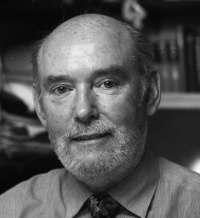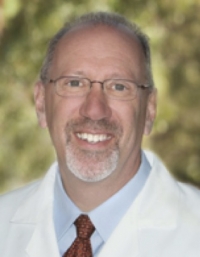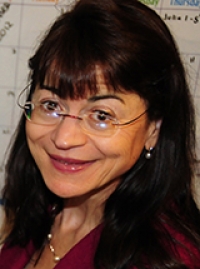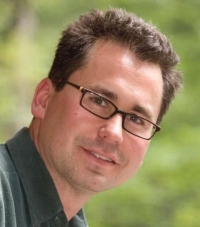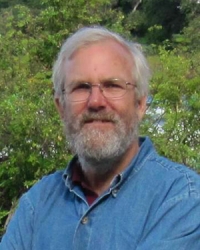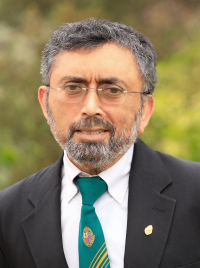Unique Features of Human Skin
Biographical Sketches: Co-Chairs
UC San Diego
Pascal Gagneux is CARTA's Executive Co-Director, a Professor of Pathology and Anthropology, and the Department Chair of Anthropology at UC San Diego. He is interested in the evolutionary mechanisms responsible for generating and maintaining primate molecular diversity. The Gagneux laboratory studies cell-surface molecules in closely related primates species. His focus is on glycans, the oligosaccharides attached to glycolipids and glycoproteins of the surfaces of every cell and also secreted into the extra-cellular matrix. Gagneux's laboratory is exploring the roles of molecular diversity in protecting populations from pathogens as well as potential consequences for reproductive compatibility. Dr. Gagneux’s interest is in how glycan evolution is shaped by constraints from endogenous biochemistry and exogenous, pathogen-mediated natural selection, but could also have consequences for sexual selection. Dr. Gagneux has studied the behavioral ecology of wild chimpanzees in the Taï Forest, Ivory Coast, population genetics of West African chimpanzees, and differences in sialic acid biology between humans and great apes with special consideration of their differing pathogen regimes. In 2011, while Associate Director of CARTA, Dr. Gagneux helped to establish a graduate specialization in Anthropogeny at UC San Diego. This wholly unique graduate specialization is offered through eight participating graduate programs in the social and natural sciences at UC San Diego.
Pennsylvania State University
Nina G. Jablonski is the Evan Pugh Professor of Anthropology at Pennsylvania State University. A biological anthropologist by training, Jablonski pursues basic research on the evolution of adaptations of primates, including humans, to their environment. For the last 25 years, she has been most intrigued by questions in human evolution not directly answered by the fossil record, foremost among these being the evolution of human skin and skin pigmentation. From an initial interest in the evolution of skin pigmentation, Jablonski has pursued issues surrounding the meanings of skin color in modern life, notably the relationships to health and society. In addition to her scholarly articles on skin and skin color, Jablonski has written two popular books on the subject, Skin: A Natural History (2006) and Living Color: The Biological and Social Meaning of Skin Color (2012), both published by University of California Press. Jablonski received her A.B. in biology at Bryn Mawr College in 1975 and her Ph.D. in anthropology at the University of Washington in 1981. She is an elected Fellow of the American Academy of Arts and Sciences, the American Philosophical Society, and the American Association for the Advancement of Science, and a member of the Board on Behavioral, Cognitive, and Sensory Sciences of the U.S. National Research Council. She is the recipient of an Alphonse Fletcher, Sr. Fellowship (2005), a Guggenheim Fellowship (2012), and an honorary doctorate from University of Stellenbosch in South Africa (2010) for her contribution to the worldwide fight against racism. Jablonski’s current research and educational projects are funded by grants from the National Science Foundation and the Robert Wood Johnson Foundation and include a project examining the factors that affect vitamin D status in healthy young adults in South Africa, the writing of a graphic novel about skin color for South African middle school children, and the development of a science summer camp curriculum for minority and underserved middle school students in the U.S.
Biographical Sketches: Speakers
University of California, San Francisco
James E Cleaver is Emeritus Professor of Dermatology and Pharmaceutical Chemistry in the Department of Dermatology a UC San Francisco (UCSF). He has been at UCSF since 1966, initially in the UCSF Laboratory of Radiobiology from 1966 to 1995. In 1968 he discovered that the hereditary human skin cancer xeroderma pigmentosum was caused by mutations in the genes that code for DNA repair, and more recently worked on a closely related DNA repair disease Cockayne syndrome. His major interests are in the toxic and mutagenic response of human cells to a variety of DNA damaging agents and the clinical consequences in cancer, developmental disorders and neurodegeneration.
University of California, San Diego
Richard Gallo is a prominent American physician-scientist who has made several scientific discoveries that have revolutionized our understanding of the immune system. He is a pioneer in studying how antimicrobial peptides and the microbiome are fundamental to human health. His group first discovered the existence of antimicrobial peptides in mammalian skin and has published several landmark observations of how these molecules are involved in skin disorders such as atopic dermatitis, rosacea, UV injury and psoriasis. His work has also advanced understanding of the roles of Vitamin D in immunity, and he was among the first researchers to uncover molecular mechanisms by which the skin microbiome benefits human immunity. He has over 300 publications and has been cited over 15,000 times. His publications include papers featured in some of the most high profile scientific and medical journals including: Nature, Science, Nature Medicine, the New England Journal of Medicine, the Journal of Clinical Investigation and many others.
Dr. Gallo received his B.A. from the University of Chicago and his M.D. and Ph.D. degree in toxicology and biophysics from the University of Rochester. He completed an internship in pediatrics at Johns Hopkins Hospital followed by residency in dermatology and research fellowship at Harvard Medical School. In 1999 he joined the faculty of the UC San Diego and was appointed Professor and Chief of Dermatology in 2005. In 2015 Dr. Gallo founded the first Department of Dermatology at UC San Diego.
He has been the recipient of numerous honors and awards including the Montagna award from the Society of Investigative Dermatology, the CE.R.I.E.S. Award recognizing outstanding international contribution to skin research, and the Sultzberger Lectureship from the American Academy of Dermatology. His work has been honored by invitations to many prestigious international venues and has spoken on 5 continents to deliver lectures to many different audiences including a Nobel Lectureship at the Karolinska Institute in Sweden and Keynote Lectureships to a variety of audiences in immunology, microbiology, infectious disease, pathology, wound healing and dermatology. Dr Gallo has been elected to the American Society of Clinical Investigation, The Association of American Physicians, the American Dermatologic Association and The American Academy of Microbiology.
University of California, San Diego
Rob Knight is the founding Director of the Center for Microbiome Innovation and Professor of Pediatrics, Bioengineering, Computer Science & Engineering and Halıcıoğlu Data Science Institute at UC San Diego. He is the Wolfe Family Endowed Chair in Microbiome Research at Rady Children's. He is a Fellow of the American Association for the Advancement of Science and of the American Academy of Microbiology. He was honored with the 2019 NIH Director’s Pioneer Award for his microbiome research and received the 2017 Massry Prize, often considered a predictor of the Nobel. He is the author of “Follow Your Gut: The Enormous Impact of Tiny Microbes” (Simon & Schuster, 2015), coauthor of “Dirt is Good: The Advantage of Germs for Your Child’s Developing Immune System (St. Martin’s Press, 2017), and has written over 900 scientific articles. He spoke at TED in 2014 which is viewed over 2.2 million times. His lab has produced many of the software tools and laboratory techniques that enabled high-throughput microbiome science, including the QIIME pipeline (cited over 50,000 times as of this writing) and UniFrac (cited over 12,000 times including its web interface). He is co-founder of the Earth Microbiome Project, the American Gut Project, and the company Biota, Inc., which uses DNA from microbes in the subsurface to guide oilfield decisions. His work has linked microbes to a range of health conditions including obesity and inflammatory bowel disease, has enhanced our understanding of microbes in environments ranging from the oceans to the tundra, and made high-throughput sequencing techniques accessible to thousands of researchers around the world. Dr. Knight can be followed on Twitter (@knightlabnews) or on his web site http://knightlab.ucsd.edu/.
Harvard University
Christopher Kuzawa is Professor of Human Evolutionary Biology at Harvard University. His research explores developmental influences on adult biology and health, the psychobiology of human fatherhood, non-genetic forms of biological inheritance, and the energetics and evolution of the human brain. Kuzawa's work also addresses the history and misuse of race concepts in anthropology and beyond. He cares and thinks deeply about the societal implications of research in human biology, and am committed to engaging beyond anthropology and beyond academia. For example, he recently testified to the State of California Task Force to Study and Develop Reparation Proposals for African Americans, and published a 2023 Op Ed in the Los Angeles Times highlighting how health disparities in the U.S. further justify reparations to Black Americans. Kuzawa received his PhD in Anthropology and MSPH in Epidemiology from Emory University. He is co-director of the Health Inequality Network of the Human Capital and Economic Opportunity Working Group, and an elected member of the US National Academy of Sciences and the American Academy of Arts and Sciences.
Icahn School of Medicine at Mount Sinai
Sarah E. Millar, PhD is Director of the Institute for Regenerative Medicine and the Black Family Stem Cell Institute, Dean for Basic Science, and Lillian and Henry M. Stratton Professorial Chair in the Departments of Cell, Developmental and Regenerative Biology, Oncological Sciences, and Dermatology at the Icahn School of Medicine at Mount Sinai. Her research focuses on inter-cellular signaling, transcriptional, and epigenetic regulatory mechanisms in development, regeneration and stem cells of epithelial tissues. She is an Editorial Board member for Developmental Cell and Experimental Dermatology, and a Senior Editor for the Journal of Investigative Dermatology. Dr. Millar has received several awards in recognition of her research, including an NIH MERIT Award for her work on Wnt signaling in the skin, and the 2017 William Montagna Lectureship Award of the Society for Investigative Dermatology.
Georgia Tech
Dr. Michael N. Sawka is Chief Scientific Officer of Environmental Physiology and Hydration Associates, as well as Professor of Applied Physiology at Georgia Institute of Technology. He is an expert in environmental (heat, cold, high-altitude) physiology, temperature regulation, fluid / electrolyte balance, exercise physiology, and rehabilitation medicine. Dr. Sawka has published more than 300 full-length manuscripts, book chapters, and reports, and has edited graduate textbooks on environmental physiology and exercise physiology. He serves on numerous editorial boards and scientific panels.
Pennsylvania State University
Mark Shriver received his B.S. degree in biology from the State University of New York, Stony Brook in 1987, worked as a laboratory technician at the New York University Medical Center, and completed his Ph.D. degree in genetics and biomedical research in 1993 at the University of Texas/Houston Health Science Center in the Center for Demographic and Population Genetics. Shriver then worked as a postdoctoral fellow in the University of Pittsburgh Department of Human Genetics, and in 1997, took a position as Assistant Professor of Human Genetics at the Allegheny University of the Health Sciences. In 1999, he moved his laboratory to Pennsylvania State University and was recently (2012) promoted to Professor of Anthropology and Genetics. Dr. Shriver heads projects emphasizing the practical applications of population genomic research. These projects are primarily focused on admixture mapping, signatures of natural selection, and the elucidation of the evolutionary-genetic architecture underlying phenotypic variability in common trait variation. A major goal of his work is to apply these methods and understanding of genomic variation to studies of common diseases (e.g., obesity, type 2 diabetes, adaptation to altitude, hypertension, and prostate cancer) and to normal variation, with a particular focus on superficial traits like skin pigmentation and facial features. Dr. Shriver has been funded by the NIH, NSF, NIJ, DTRA, DOD, and AHA and has published over 100 research articles, which have been cited over 12,000 times.
Max Planck Institute for Evolutionary Anthropology
Mark Stoneking directs the Human Population History Group in the Department of Evolutionary Genetics at the Max Planck Institute for Evolutionary Anthropology in Leipzig, Germany. He is also Honorary Professor of Biological Anthropology at the University of Leipzig. Stoneking’s research uses molecular genetic approaches to address questions of anthropological interest concerning the origins, migrations, structure, and relationships of human populations. He received his Ph.D. from UC Berkeley, and he was on the faculty of the Department of Anthropology at Pennsylvania State University from 1990 until 1999.
UC San Diego School of Medicine
Ajit Varki is a Distinguished Professor of Medicine and Cellular & Molecular Medicine, Emeritus Co-Director of CARTA, Emeritus Co-Director of the Glycobiology Research and Training Center at UC San Diego, and Adjunct Professor at the Salk Institute. He received basic training in physiology, medicine, biology, and biochemistry at the Christian Medical College (CMC), Vellore, The University of Nebraska, and Washington University in St. Louis. He also has formal training and board certification in internal medicine, hematology, and oncology. Varki is the executive editor of Essentials of Glycobiology (Cold Spring Harbor Press, 4th Edition, 2022) and is recipient of a MERIT award from the NIH, and an American Cancer Society Faculty Research Award. Honorific elections include the American Academy of Arts and Sciences, the National Academy of Medicine, the American Society for Clinical Investigation, and the Association of American Physicians. He is also recipient of the three highest honors in his field, the Karl Meyer Award of the Society for Glycobiology, the International Glycoconjugate Organization Award and the Rosalind Kornfeld Award for Lifetime Achievement in Glycobiology. He is recognized for creating the first major open access research journal (J. Clin. Invest., 1996) as well as the first major open access textbook (Essentials of Glycobiology, 2009). He was honored with the Old Cottonian of Eminence Award at the 150th Anniversary of Bishop Cotton Boys School, Bangalore, India, (2015) as well as a Distinguished Faculty Medal and Oration at his medical school alma mater, CMC, Vellore. Significant past appointments include: Co-Head, UC San Diego Division of Hematology-Oncology; President of the Society for Glycobiology; Editor-in-Chief of the Journal of Clinical Investigation; Interim Director of the UC San Diego Cancer Center, President of the American Society for Clinical Investigation, and UC San Diego Associate Dean for Physician-Scientist Training. Varki's research interests are focused on a family of cell surface sugars called sialic acids, and their roles in biology, evolution and disease. Currently, active projects are relevant to the roles of sialic acids in microbial infectivity, the regulation of the immune response, the progression and spread of tumors, aging, and unique aspects of human evolution. His group is particularly intrigued to find multiple interrelated differences in sialic acid biology between humans and our closest evolutionary cousins, the "great apes." These differences are a signature of the events that occurred during the last few million years of human evolution, and appear to be relevant to understanding several aspects of the current human condition, both in health and disease. Varki’s book, Denial (Twelve, Hachette Books, 2013), explores a novel "Mind Over Reality Transition” (MORT) theory that denying reality and personal mortality was a key step in allowing the emergence of a full theory of mind, and in the origin of our species.



